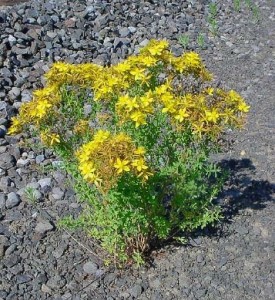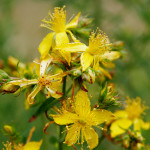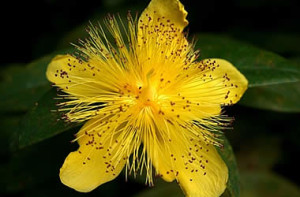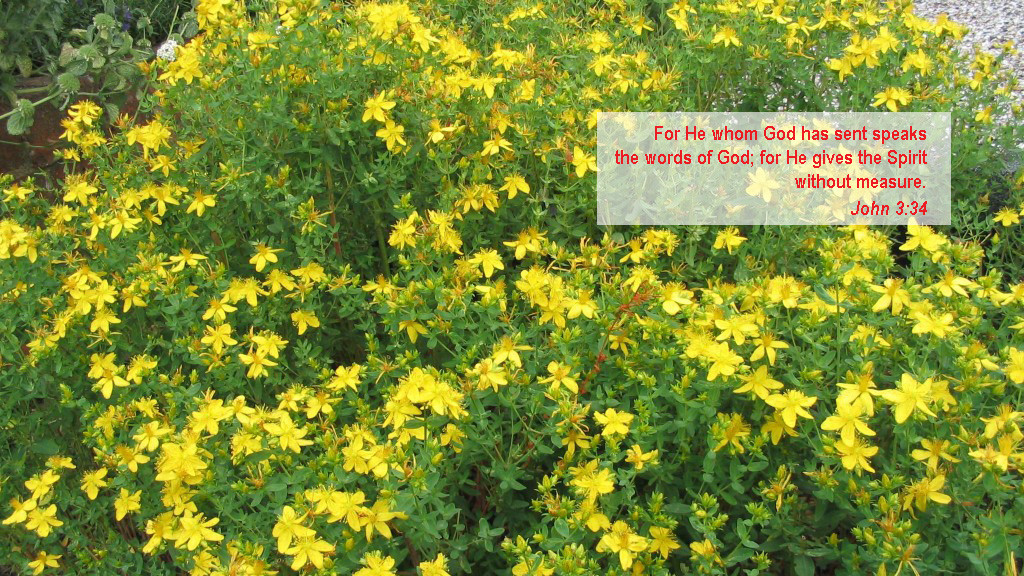 Hypericum perforatum. (Symphytum officinale)
Hypericum perforatum. (Symphytum officinale)
Description.
Common St. John’s Wort shoots forth brownish, upright, hard, round stalks, two feet high, spreading many branches from the sides up to the tops of them, with two small leaves set one against another at every place, which are of a deep green colour, somewhat like the leaves of the lesser Centaury, but narrow, and full of small holes in every leaf, which cannot be so well perceived, as when they are held up to the light; at the tops of the stalks and branches stand yellow flowers of five leaves a-piece, with many yellow threads in the middle, which being bruised do yield a reddish juice like blood; after which come small round heads, wherein is contained small blackish seed smelling like rosin. The root is hard and woody, with divers strings and fibres at it, of a brownish colour, which abides in the ground many years, shooting anew every Spring.
 Place.
Place.
This grows in woods and copses, as well those that are shady, as open to the sun.
Time.
They flower about Midsummer and July, and their seed is ripe in the latter end of July or August.
Government and virtues.
It is under the celestial sign Leo, and the dominion of the Sun. It may be, if you meet a Papist, he will tell you, especially if he be a lawyer, that St. John made it over to him by a letter of attorney. It is a  singular wound herb; boiled in wine and drank, it heals inward hurts or bruises; made into an ointment, it open obstructions, dissolves swellings, and closes up the lips of wounds. The decoction of the herb and flowers, especially of the seed, being drank in wine, with the juice of knot-grass, helps all manner of vomiting and spitting of blood, is good for those that are bitten or stung by any venomous creature, and for those that cannot make water. Two drams of the seed of St. John’s Wort made into powder, and drank in a little broth, doth gently expel choler or congealed blood in the stomach. The decoction of the leaves and seeds drank somewhat warm before the fits of agues, whether they be tertains or quartans, alters the fits, and, by often using, doth take them quite away. The seed is much commended, being drank for forty days together, to help the sciatica, the falling sickness, and the palsy.
singular wound herb; boiled in wine and drank, it heals inward hurts or bruises; made into an ointment, it open obstructions, dissolves swellings, and closes up the lips of wounds. The decoction of the herb and flowers, especially of the seed, being drank in wine, with the juice of knot-grass, helps all manner of vomiting and spitting of blood, is good for those that are bitten or stung by any venomous creature, and for those that cannot make water. Two drams of the seed of St. John’s Wort made into powder, and drank in a little broth, doth gently expel choler or congealed blood in the stomach. The decoction of the leaves and seeds drank somewhat warm before the fits of agues, whether they be tertains or quartans, alters the fits, and, by often using, doth take them quite away. The seed is much commended, being drank for forty days together, to help the sciatica, the falling sickness, and the palsy.
 Nicholas Culpeper
Nicholas Culpeper

